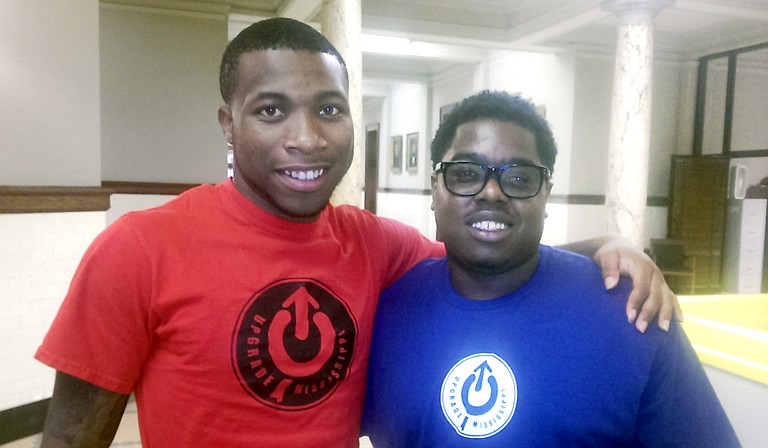Marquette Pickett (left) and Antron McKay-West (right) Photo by R.L. Nave.
Thursday, July 30, 2015
When Marquette Pickett, a student at Tougaloo College, had an abscessed tooth and had to go to the dentist, the exam alone cost him $200 out of his own pocket.
"The money that comes out my pocket is the money that's going toward my tuition at school," Pickett, 20, told the Jackson Free Press.
Even though the Affordable Care Act, which Congress passed in 2010, allows young people to remain on their parents' insurance policies until age 26, young people whose parents don't have health insurance or have limited coverage can be left in the lurch when they get sick.
It's one of the reasons that Antron McKay-West, a graduate student at Jackson State University, founded a youth-led nonprofit organization called upGrade Mississippi to raise awareness about health-care access and healthy living for college students.
This morning McKay-West joined other advocates for health-care access at a "birthday party" for the Medicaid and Medicare programs, both established 50 years ago this week. Medicaid is a joint program funded in part by the federal and state governments, which has been a lightning rod since the passage of the ACA and the U.S. Supreme Court's upholding of the law in 2012 and again this year. Medicare is a federally funded program for senior citizens.
State officials, political candidates and activists renewed a call to state leaders to expand Mississippi's Medicaid program, which would cover about 300,000 more people. The state's mostly Republican-led leadership has declined to expand the program and accept billions in federal matching funds to help offset costs.
Information from the Center on Budget and Policy Priorities shows that 781,700 people are already receiving Medicaid, which improves the health of individuals as well as the state, which consistently ranks among the least healthy in the nation.
Although local colleges operate campus clinics, more serious health problems might require a trip to the emergency room.
"For the students whose parents can't afford insurance, it's a big impact on them because (they) get sick from time to time in college," McKay-West said.
"We talked to a lot of students who don't have Medicaid and it's like they're stuck at a standstill when a bill comes in, along with student loans, to be able to pay for healthcare. That could be that difference between you being able to graduate from college and being that difference in you being able to have a great semester," he said.

Comments
Use the comment form below to begin a discussion about this content.
Sign in to comment
Or login with:
OpenID